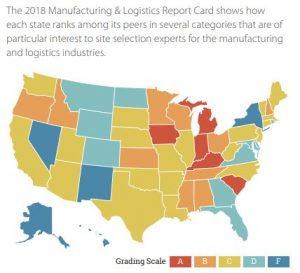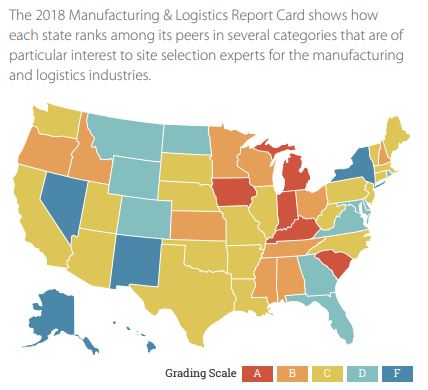 The Conexus Indiana 2018 Manufacturing and Logistics National Report is out and Florida earned a resounding “D” in Manufacturing Industry Health overall. You can see the full Florida Report here: https://conexus.cberdata.org/state/FL
The Conexus Indiana 2018 Manufacturing and Logistics National Report is out and Florida earned a resounding “D” in Manufacturing Industry Health overall. You can see the full Florida Report here: https://conexus.cberdata.org/state/FL
“Human Capital” dropped to a “C” from 2009, and has remained there for the last five years, while “Productivity and Innovation” has never been able to get above a C here, either.
These are two critical categories where AMRoCs work will be focused.
About Human Capital, the report says, “No factor matters more to businesses than the quality and availability of labor. Workers are the source of most innovation and process improvements that distinguish successful firms from those that are not successful. Human capital (especially quality of educational background) is the most important factor in firm location decisions.”
Productivity and Innovation is closely related to the development of “Human Capital”: “Though innovations and inventions are aggressively sought from across the globe, the presence of local talent in these areas through access to university laboratories and non-profit research activities plays an important role in location decisions by manufacturers.”
Without strengthening these two critical categories, Florida will continue struggling to achieve national competitiveness Apprenticeships, of course, are one of the most obvious solutions to both of these issues, but while there are nearly 500,000 registered apprenticeships in the U.S. (National Skills Coalition) (200+ in Florida, as per the Dept of Labor), the numbers of individuals completing them varies between 75% to 80% (Department of Labor). And while those numbers looked better in 2018, there is still a big gap in evidence based data that could help Florida and the nation get a better understanding of that human capital aspect as it relates to apprenticeships. Shortfalls, according to the National Skills Coalition, include:
- No Comprehensive Centralized Database
- Lack of Publicly Accessible Information
- Non-Uniformity of Skills Underlying Certificates
The National Skills Coalition recommends, among other things , better documenting credentials like certifications, licenses, diplomas, or degrees to better show employers that apprentices have particular competencies. There is also only limited data on whether or not apprentices are employed they complete their apprenticeships, and in which industries or occupations to help show whether apprentices are gaining market-relevant skills.
AMRoC will focus strongly on certifications, and is building a robust data collection system and best practices library into our programming, with the goal of being a collaborative research-based and active learning facility where everyone can come to the table to explore manufacturing, engineering and practical skills education for people of all ages. We’re excited about the possibilities, and look forward to working with community partners to do our part to help raise Florida’s manufacturing industry health grade and improve our collective future.

